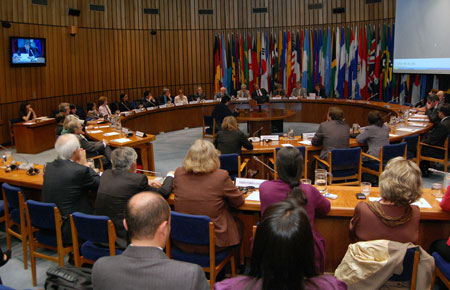Report Highlights Region's Achievements in the Development of Statistics
Work area(s)
Government officials commemorated World Statistics Day with an event at Commission headquarters in Santiago, Chile.

(19 October 2010) Over the past decade the great majority of Latin American and Caribbean countries made significant progress in the development of statistics in different fields, says a new ECLAC report released today in Santiago, Chile.
The report Development of Official Statistics in the Region was presented by ECLAC Executive Secretary Alicia Bárcena in the context of World Statistics Day, celebrated today in this United Nations regional commission.
The report, which describes the main trends in the development of official statistics in Latin America and the Caribbean and the most important challenges ahead, outlines some of the main achievements of countries in the region. Among them:
- Of 41 countries included in the report, 40 have carried out population censuses in the past 10 years and 38 of them will do so between 2010 and 2013.
- Every country has a multi-purpose, periodic household survey programme, or at least one focused on employment.
- Over the past decade, 18 additional countries adopted the 1993 National Accounts System. In total, 29 countries use this system for calculating their macroeconomic statistics.
- A rising number of countries count with gender indicator systems, while the rest have begun to collect data on gender disparities and disaggregates per gender.
- The great majority of countries have vital statistics systems that produce periodic data on births, deaths and others.
- Towards 2008, 21 countries had environmental statistics programmes, while 14 of 28 national agencies had a unit assigned exclusively to this issue.
- 24 countries (8 from the Caribbean and 16 from Latin America) had published statistics on information and communications technologies.
"These achievements have been possible thanks to the efforts of governments, in close cooperation with different international organizations that provide technical and financial support to these tasks, particularly the Statistical Conference of the Americas, a subsidiary body of ECLAC," explained Bárcena.
The celebration of World Statistics Day at ECLAC coincided with a "Workshop on the Governance of Statistics Systems", attended by high-ranking government officials in charge of statistics from several countries in the world.
"The provision of reliable, quality, objective and timely statistics is a basic State function and is a public good by nature," stated Bárcena.
"Statistics play a very significant role, because they are an essential tool in support of public administration based on results. They are also instruments that ensure transparency in public decision-making and are a very important link between national and world data, based on methodologies that generate comparable statistics at a regional and international level," she said.
The Minister of Economy, Planning and Development of the Dominican Republic, Temístocles Montás, the Minister of Finance of Paraguay, Dionisio Borda, the Minister of Planning of Chile, Felipe Kast, and the Director of the National Statistics Administrative Department of Colombia (DANE) and Representative of the Statistical Conference of the Americas, Héctor Maldonado, also spoke during the commemorative event of World Statistics Day.
A message sent by United Nations Secretary-General Ban Ki-moon on occasion of the celebration was also read during the event.
"Statistics are a vital tool for economic and social development, including our efforts to achieve the Millennium Development Goals. Statistics are a central consideration in justifying almost every aspect of budgets and programmes that enable hungry children to be fed or that provide shelter and emergency health care for victims of natural disasters," said Ban Ki-moon in his message.
World Statistics Day, which is celebrated on 20 October all over the world, was established by resolution of the United Nations General Assembly in June this year under the theme "Celebrating the many achievements of official statistics", acknowledging their importance for national socio-economic development and as a basic pillar of democracy.
More information on World Statistics Day is available on the ECLAC webpage.
For inquiries, please contact ECLAC's Public Information and Web Services Section.
Email: dpisantiago@cepal.org; telephone: (56-2) 210-2040.
Related content
Día Mundial de la Estadística
Por Alicia Bárcena, Secretaria Ejecutiva de la CEPAL
World Statistics Day
Message by the Secretary-General of the United Nations, Ban Ki-moon.
Country(ies)
- Latin America and the Caribbean
-
Chile
Contact
Public Information Unit
- prensa@cepal.org
- (56 2) 2210 2040
